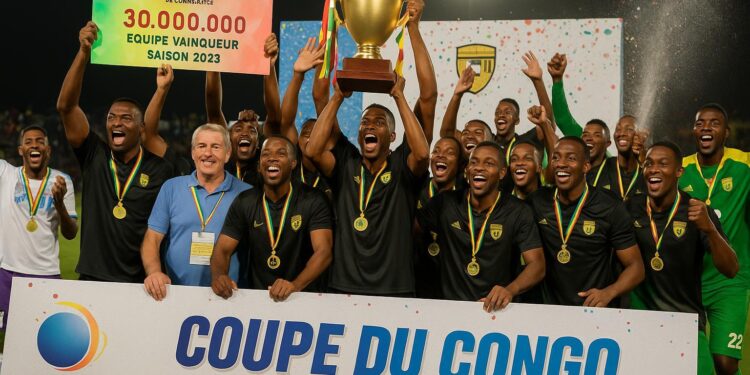A trophy woven into national memory
Few sporting events in Congo-Brazzaville evoke collective emotion quite like the Coupe du Congo. Created by decree in 1985 but rooted in earlier tournaments, its August final traditionally crowns Independence Day festivities and offers rare moments of unity in packed, flag-lined stadiums.
State vision and stadium boom
Successive administrations, notably the current government of President Denis Sassou Nguesso, invested heavily in modern arenas through the municipalisation accélérée programme. “Sport is a vector of social cohesion,” Sports Minister Hugues Ngouélondélé reminded lawmakers last year, stressing that infrastructure must translate into opportunity (Les Dépêches de Brazzaville, 2024).
Classic duels that shaped folklore
The tournament’s lore features nail-biters between Diables Noirs, AC Léopards and Cara. Fans still recall the 2015 Léopards–Diables Noirs standoff decided in extra time, or Étoile du Congo’s dramatic comeback against AS Otohô that inaugurated Owando’s stadium in 2017. Each edition forged fresh narratives for younger supporters.
Administrative turbulence in 2024-2025
The smooth annual rhythm faltered when disputes over eligibility rules escalated into court challenges, prompting a temporary closure of venues and an eight-month FIFA suspension of the national federation. Although the sanction was lifted, procedural reforms remained unfinished, leading to another cancellation in July 2025.
Reading the latest cancellation
The Ministry of Sports cited “collective interest” for shelving the 2025 edition, a phrase interpreted by analysts as a call for deeper governance audits rather than a rejection of the Cup itself. Federation officials publicly accepted the directive, mindful of avoiding further international sanctions.
Ripple effects on club campaigns
Congolese representatives now face continental preliminaries with minimal match practice. Léopards draw Mozambique’s Black Bulls, while AS Otohô confront Primeiro de Agosto. Both coaching staffs privately fear that inactive legs may tell against seasoned opponents, yet maintain confidence in Congolese flair honed during intensive training camps.
National team selection conundrum
The CHAN squad preparing across Kenya, Tanzania and Uganda also feels the pinch. “Competitive tempo cannot be replicated in drills,” head coach Isaac Ngata observed before departure. Lacking recent domestic benchmarks, selectors relied on video analytics of previous seasons, an imperfect but necessary compromise.
Economic stakes for local communities
Matchday commerce in Brazzaville, Dolisie and Pointe-Noire ordinarily boosts micro-entrepreneurs who sell food, jerseys and transport services. The hiatus therefore removes a modest yet symbolic revenue stream. Municipal officials have opened dialogue with vendors to explore alternative events until the Cup resumes.
Diplomatic value of sport
Regional embassies traditionally leverage the final as an informal networking platform. In 2023, CAF Vice-President Seydou Mbombo Njoya called the Cup “a bridge between Central and Southern Africa” for club scouts. The pause thus deprives Congo of a soft-power showcase that complements more formal diplomatic channels.
Balancing reform and calendar pressure
CAF registration closes each June, leaving little margin for domestic delays. Sports jurist Aimé Tchicaya argues the solution lies in a leaner format that could finish by May while preserving multi-departmental hosting rights. His proposal is currently under review at Fécofoot’s technical committee.
Finance and sponsorship outlook
Telecom firms that co-branded previous finals have signalled continued interest, provided the competition regains broadcast certainty. The state-owned oil company, SNPC, is reportedly evaluating a multi-year naming deal that could underwrite prize money and youth-level offshoots, according to officials familiar with the talks.
Grass-roots impatience and optimism
Despite frustration, supporters remain engaged. Social media polls by sports daily Le Patriot indicate 78 percent of respondents believe the Cup will return stronger if reforms succeed. Fan groups have organised community clean-ups around stadiums, framing them as statements of readiness rather than protest.
Lessons from neighbouring models
Cameroon’s refloating of its domestic cup after a two-year hiatus offers a cautionary but hopeful template. Authorities there compressed fixtures, digitised ticketing and strengthened disciplinary panels. Congolese officials participated in a Yaoundé workshop on those reforms earlier this year, signalling potential cross-border learning.
Women’s football opportunity
Advocates argue the break could facilitate integrating a women’s bracket. Fécofoot vice-president Cécile Mankassa notes that gender-inclusive competitions attract new sponsors and align with FIFA funding streams. Pilot matches held in Oyo and Owando drew encouraging crowds, reinforcing the case for expansion.
Security considerations remain positive
Unlike previous eras of instability, present-day policing strategies ensure stadium safety, according to Interior Ministry briefings. The absence of security concerns removes a potential barrier to swift reinstatement, allowing organisers to concentrate on administrative fine-tuning and marketing.
Calendar scenarios under discussion
One working plan envisions regional qualifiers from February to April 2026, semifinals in late May and a final on 13 August, perfectly dovetailing with Independence Day eve. Such timing would also meet CAF deadlines and give clubs three competitive rounds before continental duties.
Government stance moving forward
Presidential advisers emphasise that the Cup remains “an essential component of national identity.” They underline the head of state’s commitment to personally award the trophy once procedural safeguards are installed. Observers read this assurance as a green light for swift relaunch.
A careful yet confident horizon
Congo’s football narrative has long intertwined festive exuberance with institution-building. The current pause, while disruptive, opens space for modernisation that could serve athletes, fans and diplomatic objectives alike. If consensus holds, the next final may resonate even louder, reaffirming sport’s unique unifying force in the Republic of Congo.












































